Spinach vs Broccoli: Which is Better? A Complete Comparison
Part of being a Certified Health Coach is to inform people about healthy foods like spinach and broccoli. Many of my clients ask me which one is preferred. Let’s answer, which is better, spinach or broccoli?
Spinach is better than broccoli due to its higher percentage of B vitamins and minerals. Spinach has less calories and carbohydrates making it better for weight loss and low-carb diets. Spinach has a lower glycemic index than broccoli and can be used in more raw dishes than broccoli like sandwiches.
This article will start with a side-by-side comparison of their nutrients. In addition, I’ll examine their tastes, textures, prices, whether one can substitute for the other, glycemic indexes and health benefits.
In addition to coaching clients about them, I’ve purchased, researched and consumed both prior to, during and after writing this article. Both are part of my own nutrition plan.
Spinach vs Broccoli: Nutrients
The following table compares the nutrients contained in each one per 100 grams.
| Spinach, raw (100 g) | Broccoli, raw (100 g) | |
| Calories | 23 | 34 |
| Protein | 2.86 g | 2.82 g |
| Carbohydrates | 3.63 g | 6.64 g |
| Fiber | 2.2 g | 2.6 g |
| Fat | 0.39 g | 0.37 g |
| Sugar | 0.42 g | 1.70 g |
| Vitamin A | 9,380 IU | 623 IU |
| Beta-carotene | 5,630 mcg | 361 mcg |
| Vitamin C | 28.1 mg | 89.2 mg |
| Vitamin K | 483 mcg | 102 mcg |
| Vitamin D | 0 IU | 0 IU |
| Vitamin B6 | 0.19 mg | 0.17 mg |
| Vitamin B9 (Folate) | 194 mcg | 63 mcg |
| Vitamin B1 (Thiamin) | 0.08 mg | 0.07 mg |
| Vitamin B2 (Riboflavin) | 0.19 mg | 0.12 mg |
| Vitamin B3 (Niacin) | 0.72 mg | 0.64 mg |
| Vitamin B5 (Pantothenic Acid) | 0.07 mg | 0.57 mg |
| Magnesium | 79 mg | 21 mg |
| Phosphorous | 49 mg | 66 mg |
| Potassium | 558 mg | 316 mg |
| Iron | 2.71 mg | 0.73 mg |
| Copper | 0.13 mg | 0.05 mg |
| Calcium | 99 mg | 47 mg |
| Zinc | 0.53 mg | 0.41 mg |
After examining the table above it’s obvious both vegetables are nutrient dense. Between both, which one has more nutrients?
Spinach has a higher percentage of nutrients than broccoli. Spinach provides more protein, vitamin A, beta carotene, vitamin K, B6, folate, thiamin, riboflavin, niacin, magnesium, potassium, iron, copper, calcium and zinc.
Spinach is said to be healthier than broccoli due to its higher percentage of nutrients.
This isn’t to say broccoli doesn’t provide many nutrients because it does. It contains a good number of those nutrients and provides more of the following:
- Fiber
- Vitamin C
- B5
- Phosphorus
I choose both both as part of my daily nutrition due to their nutrients and benefits. I mostly use spinach in salads and smoothies and occasionally as a side dish with dinner. I mostly consume broccoli with dinners and lunches, but sometimes add small pieces into a salad.
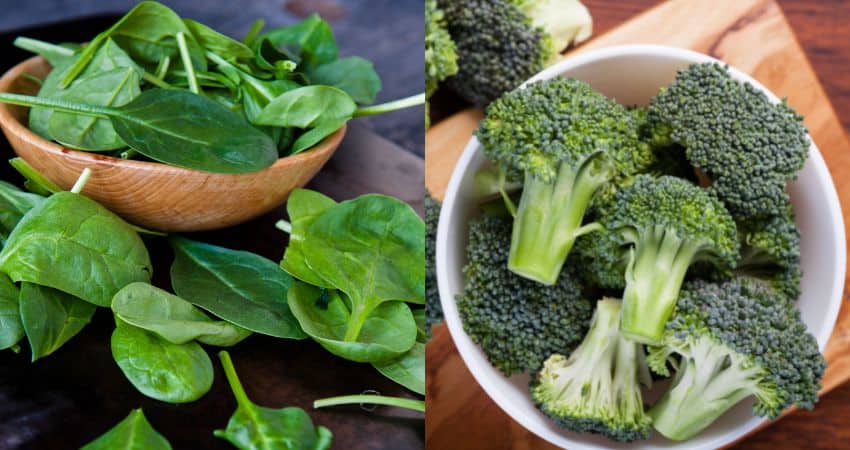
Which to Choose?
Since both vegetables are nutrient dense, the one you may want to consume more often may depend on your particular goals. Let’s examine four of the more popular goals.
Low-carb or Keto Diets
If you’re considering one of these diets, the number of carbs each food contains may make a huge difference as far as which one you eat more often. Therefore, let’s examine which one has more carbohydrates.
Broccoli has 6.64 grams of carbohydrates, and spinach has 3.63 per 100 grams making it better for low-carb diets. It provides 3.01 fewer grams, 83% less per 100 grams.
Losing Weight
If your goal is weight loss, the number of calories per serving is important. Let’s examine how many calories per serving each one contains.
Broccoli has 34 calories, and spinach has 23 calories per 100 grams making it better for losing weight. It provides 11 fewer calories equaling 48% less than spinach.
Bodybuilding
If gaining lean muscle mass is your goal then the amount of protein and carbohydrates may matter to you.
Extra healthy carbs help to fuel energy and increase performance when exercising or lifting weights. It’s why marathon runners consume much spaghetti the day before the big race.
Any extra protein helps to repair and build new muscle after putting them through a good workout. Therefore, let’s take a closer look at which is better for bodybuilding.
Broccoli is better than spinach for bodybuilding due to its higher percentage of carbs and similar number of protein. It provides 2.82 grams of protein and 83% more carbohydrates per 100 grams.
If you’re consuming carbohydrates through another food source then both are good options for bodybuilding.
Broccoli has a relatively high protein content but slightly lower than spinach.
Gluten Free
If you’re consuming a gluten free diet or have celiac disease, this can make or break your choice between the two. Between each one, which is gluten free?
Broccoli and spinach are gluten free. Therefore, if you only consume a gluten free diet, both of them are good options.
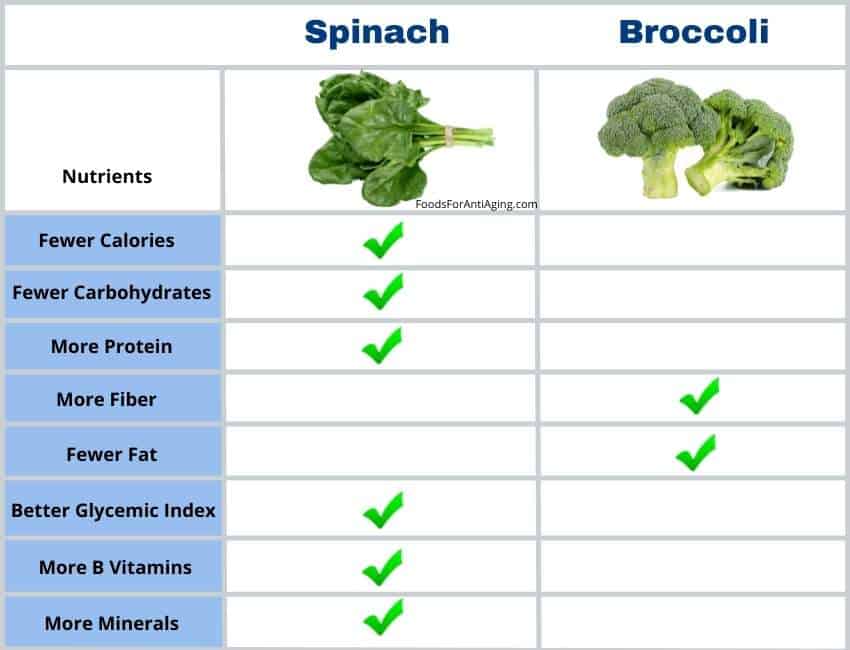
Prices
With inflation affecting the prices of just about everything lately, the cost of food certainly matters to most people. For this reason I decided to take a closer look at which food costs more.
Spinach and broccoli have a similar price. The cost for spinach averages $0.16 per ounce and broccoli averages $0.16 per ounce.
To conduct some original research, I visited some local supermarkets and compared the prices of each one. Here are my findings.
First I checked a Walmart Supercenter:
- Marketside bagged fresh spinach
- 10 ounce bag for $1.98. Equals $0.20 per ounce
- Marketside fresh broccoli florets
- 32 ounce container for $6.18. Equals $0.19 per ounce
I then checked my local Shoprite supermarket:
- Bowl and basket chopped spinach frozen
- 10 ounce bag for $1.29. Equals $0.13 per ounce
- Bowl and basket broccoli florets frozen
- 16 ounce bag for $2.00. Equals $0.13 per ounce
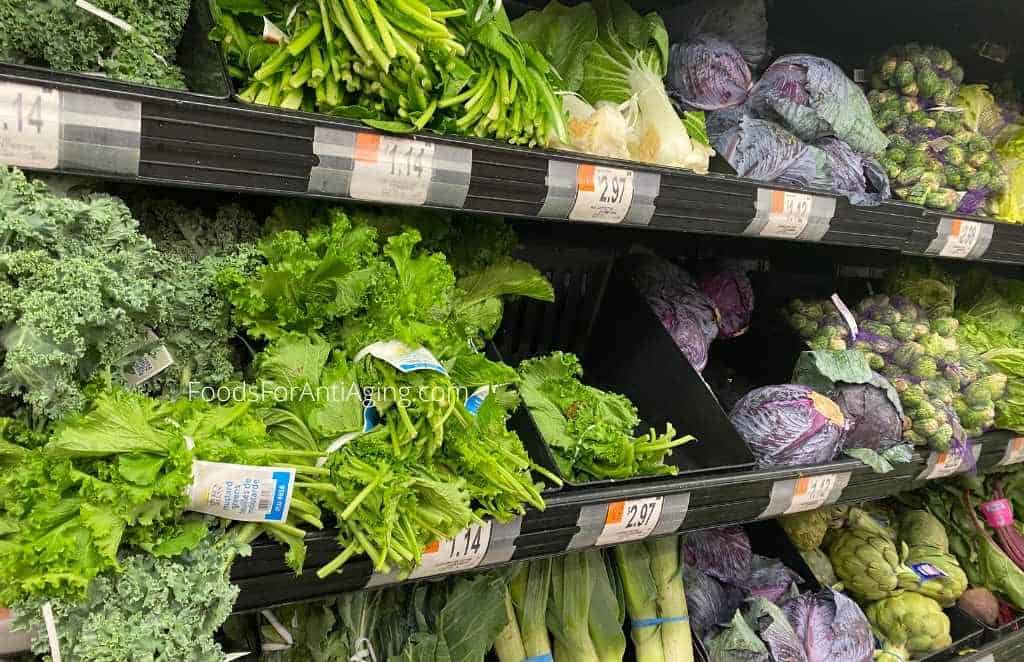
Tastes and Textures
Sometimes the nutrients or price doesn’t matter much. If you don’t like the way a food tastes it will probably remain on the store shelf. Therefore, let’s take a look at how the taste of each one compares to each other.
Spinach has a mild taste when raw and becomes more bitter when cooked. Broccoli tastes slightly bitter, earthy and mildly sweet. Raw broccoli is more bitter than cooked. The texture of spinach is thinner and softer than the thicker and tougher broccoli.
I wanted to conduct original research on the topic and get the opinion of people like yourself. So I reached out to my clients, readers and members of food groups. I asked them, which one tastes better?
- 40% said they preferred the taste of spinach.
- 52% said they preferred the taste of broccoli.
- 8% said it depended on their mood.
To conduct more research I setup and participated in a taste test at home. I used both in a smoothie without many other ingredients. This way I couldn’t tell the typical difference due to their shape and textures. I chose the smoothie with the broccoli.
In the battle of taste, broccoli vs spinach, broccoli was the winner in the poll and in my taste test.
This video informs you how to make a soup containing both vegetables.
Substitutions
For those times when you only have one of the two foods available, let’s find out if one can substitute for the other.
Broccoli and spinach can substitute for each other in most dishes although the taste and texture will be different. Cooking times will be longer when substituting broccoli for spinach unless it is used raw. Broccoli is not a good substitute for spinach on sandwiches, wraps or pizza toppings.
More than a one to one ratio of spinach to broccoli will have to be used when cooking. This is so because the leaves break down and lessen the volume of food when cooked.
Leafy greens make a better spinach substitute like the following:
- Arugula
- Bok choy
- Swiss chard
- Butterhead lettuce
- Collard greens
- Green leaf lettuce
- Romaine
- Beet greens
- Watercress
- Kale
The best broccoli substitutes include the following:
- Cauliflower
- Brussels sprouts
- Asparagus
- Kale
- Green beans
- Green cabbage
- Collard greens
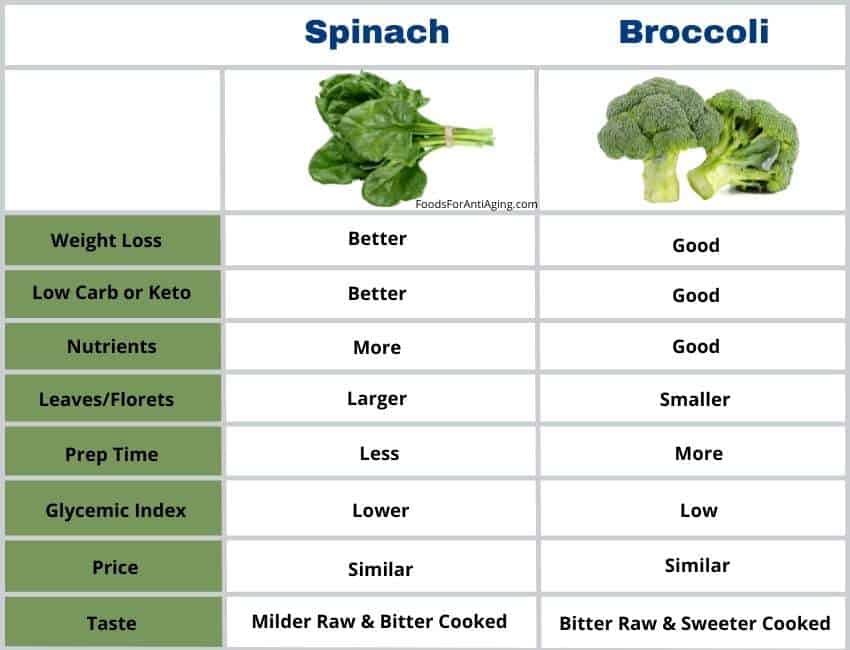
Glycemic Index
Avoiding blood sugar spikes is an important part of consuming healthy food. This is true for diabetics or anyone worrying about their health3. For this reason, the glycemic index of food is important.
The Glycemic Index (GI) is a scale measuring how fast a particular food raises the blood sugar in the blood4. Blood sugar spikes can lead to health complications with the heart, nerves, kidneys and eyes5.
Foods on the GI scale are categorized as:
- Low-GI foods: 55 or under
- Medium-GI foods: 56-69
- High-GI foods: 70 or over
How blood sugars levels are affected:
- Foods with a glycemic index 70 or more cause a quicker spike in blood sugar levels.
- Foods with a glycemic index 56 to 69 cause a moderate spike in blood sugar levels.
- Foods with a glycemic index 55 or less cause a slow spike in blood sugar levels.
Knowing more about the glycemic index of food and how it raises blood sugar, many people wonder which one has a higher glycemic index.
Spinach has a lower glycemic index than broccoli but both are considered low GI foods and shouldn’t cause much of an increase in blood sugar.
Compare the benefits of baby spinach and regular in my article. Find out if there really is a difference.

Nutritional Health Benefits
This section will examine each of the vegetable’s nutrients and how they may benefit health.
Broccoli Health Benefits
Fiber
- Broccoli provides 18% more dietary fiber per 100 grams.
Soluble fiber is helpful for many reasons ((National Center for Biotechnology Information: Mechanisms linking dietary fiber, gut microbiota and colon cancer prevention)). Soluble fiber is known for the following:
- Help in managing weight because it makes you feel full faster.
- Help avoid constipation.
- Help overall digestion.
- Manage the blood glucose levels which helps decrease the risk of diabetes.
Vitamin C
- It provides 218% more vitamin C per 100 grams.
Vitamin C acts as an antioxidant and helps with the following:
- Prevent cell damage.
- May help boost the immune system.
- Collagen production.
- Help heal wounds.
- Increases iron absorption.
- Help maintain health gums.
Phosphorus
- It provides 35% more phosphorus per 100 grams.
Phosphorus has been shown in scientific studies to help with the following:
- Help the body store and manage energy.
- Promote healthy nerve conduction.
- Promote teeth and bone health.
- Help the kidneys remove waste.
- Muscle contraction and recovery.
Find out if kale had more nutrients in my article. Find out who wins the battle of the two superfoods.
The following video explains the benefits of broccoli.
Spinach Health Benefits
Magnesium and Blood Pressure
- Spinach provides 276% more magnesium per 100 grams.
Magnesium helps the body control the following:
- Nerve function
- Blood pressure
- Muscle function
- Insomnia
- Blood sugar
One reason many people supplement with magnesium in the evening is because it helps calm the whole body including blood vessels.
Magnesium helps keep blood pressure levels stable and balanced. Recent scientific research examined previous studies and concluded magnesium supplementation decreased systolic and diastolic blood pressure6.
In the heart and muscles, magnesium competes with calcium to help the muscles relax after contracting. When the body is low in magnesium, calcium can over stimulate the heart muscle’s cells causing a rapid or irregular heartbeat7.
The following video compares the benefits of spinach and broccoli.
B Vitamins
The leafy green provides a higher percentage of five of the six B vitamins listed below.
The B vitamins provided include the following:
- B1 (thiamin)
- B2 (riboflavin)
- B3 (niacin)
- B5
- B6
- B9 (folate)
B vitamins help support the following:
- Digestion.
- Brain function.
- Energy levels.
- Red blood cells.
- Nerve function.
- Cardiovascular disease.
Vitamin A & Beta Carotene
- Spinach provides 1,400% more vitamin A and 1,450% more beta carotene per 100 grams.
Beta-carotene is a compound present in both foods. The body converts beta-carotene into vitamin A.
According to scientific studies, vitamin A helps the eyes when it comes to dim light vision and dry eyes ((National Center for Biotechnology Information: Nutrients for the aging eye)).
Besides eye health, an increased number of vitamin A has been shown to fight and prevent cardiovascular disease, which is the leading cause of death in the United States8.
In addition, vitamin A is a powerful antioxidant that can help reduce cellular damage by controlling the negative effects of free radicals9.
Potassium
- It provides 76% more potassium per 100 grams.
Potassium helps the body reduce excess fluid therefore reducing blood pressure10.
According to Harvard Health, a number of studies have shown a connection between low potassium levels and high blood pressure11. The more potassium, the more sodium your body will lose.
Find out if swiss chard has more nutrients in my article.
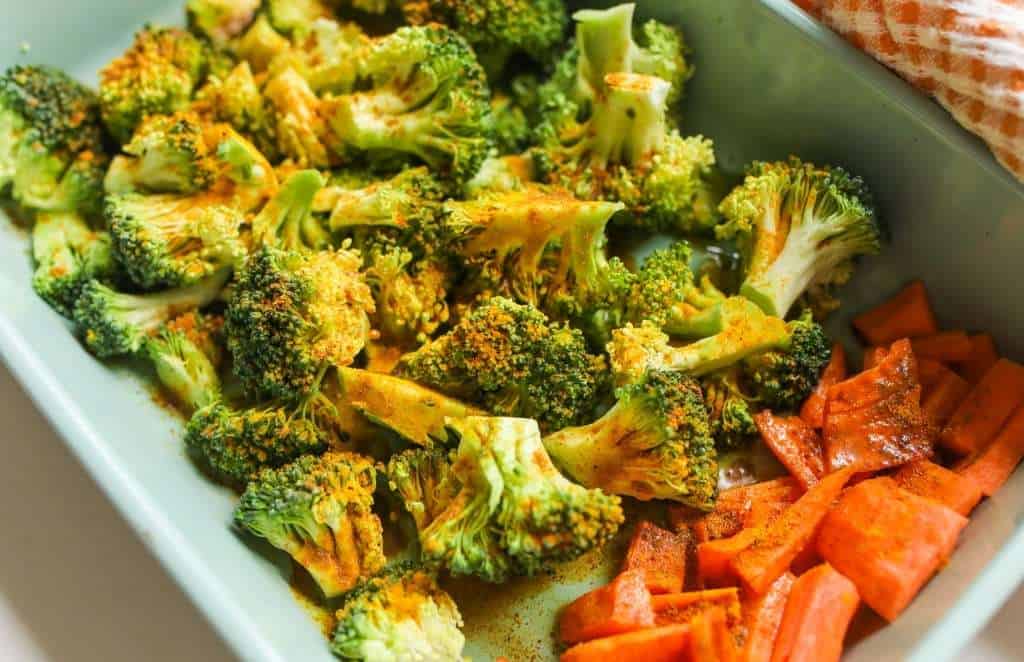
Iron
- Spinach provides 271% more iron than broccoli per 100 grams.
Iron is a necessary part of any healthy diet12 and may help with the following:
- Help the immune system.
- Is essential the creation of red blood cells.
- Help some hormones remain balanced.
- Vital for growth and development.
Find out if collard greens are better in my article, Collard Greens vs Spinach: Which is Better? A Comparison.
Calcium
Calcium helps the following:
- Helps nerve function.
- Help the muscles to function properly.
- Build and maintain strong bones.
In addition, calcium is important for the heart and blood pressure. Harvard Health reports calcium helps maintain blood pressure by helping in the controlling of the relaxing and tightening of blood vessels13.
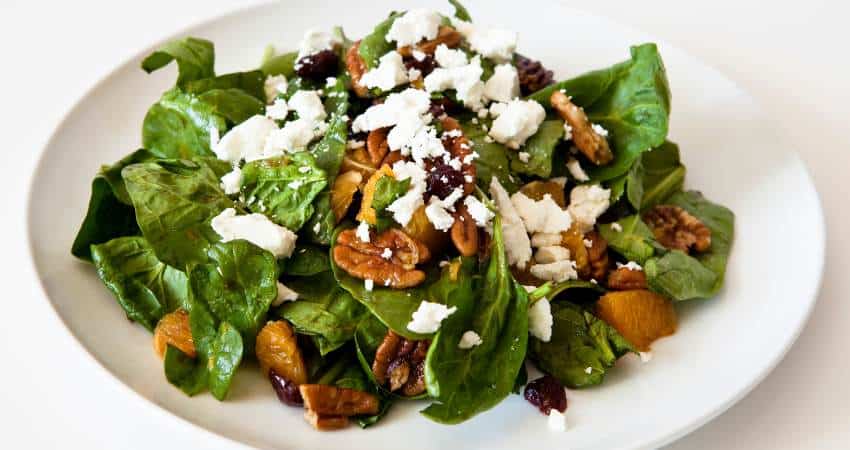
Find out if romaine is healthier in my article. Is it really that inferior?
If you have any questions about this article don’t hesitate to email us. You can find an email on our contact page.
Read More Spinach Food vs Food Articles
Frozen Spinach vs Fresh: Which is Better? A Comparison
Raw Spinach vs Cooked Spinach: Which is Better? A Comparison
Arugula vs Spinach: Which is Better? A Complete Comparison
Organic Spinach vs. Regular Spinach: What’s The Difference?
Spinach vs Lettuce: Which is Better? A Complete Comparison
- USDA: Spinach, raw [↩]
- USDA: Broccoli, raw [↩]
- The University of Sydney: Your GI Shopping Guide [↩]
- Harvard Health Publishing: Glycemic index for 60+ foods [↩]
- National Institute of Diabetes and Digestive and Kidney Diseases: Know Your Blood Sugar Numbers: Use Them to Manage Your Diabetes [↩]
- National Center for Biotechnology Information: Effect of magnesium supplementation on blood pressure: a meta-analysis [↩]
- National Institutes of Health: Magnesium [↩]
- National Center for Biotechnology Information: Antioxidant potentials of vitamin A and carotenoids and their relevance to heart disease [↩]
- National Center for Biotechnology Information: Free radicals, antioxidants and functional foods: Impact on human health [↩]
- American Heart Association: How Potassium Can Help Control High Blood Pressure [↩]
- Harvard Health: Potassium lowers blood pressure [↩]
- National Institutes of Health: Iron [↩]
- Harvard Health: Key minerals to help control blood pressure [↩]
